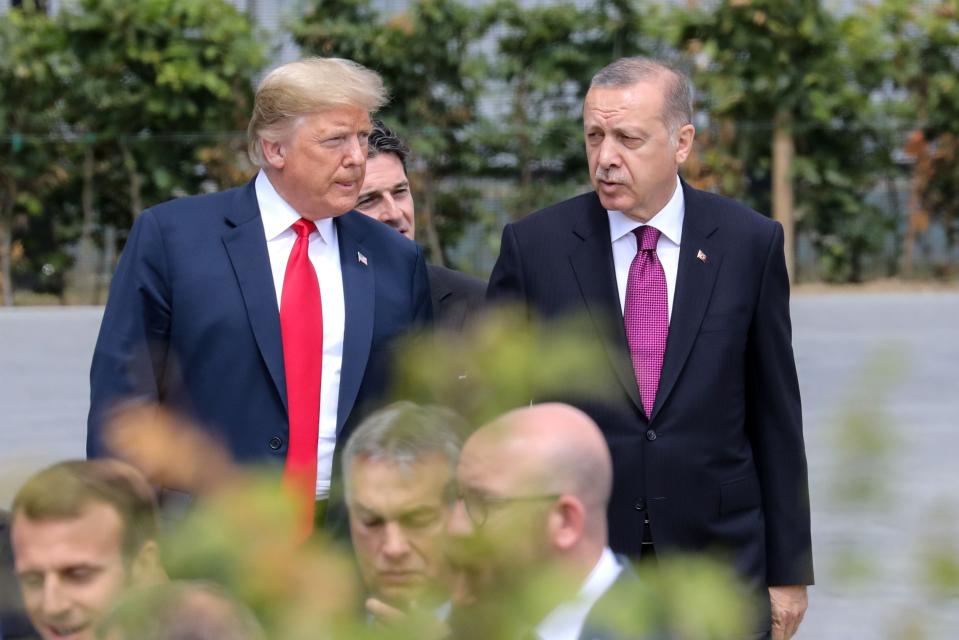Trump administration sanctions Turkey, a NATO ally, over its purchase of Russian missile defense system
- Oops!Something went wrong.Please try again later.
WASHINGTON – The Trump administration on Monday sanctioned Turkey, a NATO ally, over its purchase of a Russian missile defense system – a long-awaited move that comes just weeks before President Donald Trump leaves office.
The new sanctions include a ban on all U.S. export licenses and loans to Turkey's defense procurement agency and an asset freeze on the agency's president, Ismail Demir, among other government officials. U.S. officials have long warned that Ankara's purchase of the Russian system could jeopardize U.S. and European security.
It's not clear why the Trump administration waited until now to impose the penalties. Turkey finalized its acquisition of the Russian military system more than a year ago.
Some critics in Congress have accused Trump of being soft on Turkish President Recep Tayyip Erdogan and questioned his refusal to respond more aggressively to Turkey's purchase of the S-400 system in July 2019. Trump once declared himself a "big fan" of Erdogan even as the Turkish leader made a series of decisions that put him at odds with the U.S.
"We very much regret that this has been necessary," Christopher Ford, a top State Department nonproliferation official, told reporters during a briefing Monday.
Matthew Palmer, the State Department's deputy assistant secretary of European and Eurasian affairs, said the move "reflects some of the fundamental challenges in the U.S.-Turkey relationship," Palmer said. He said Turkey has made important contributions to NATO, but its purchase of the S-400 is "fundamentally inconsistent with its obligations as a NATO ally."
Palmer said the Trump administration "engaged in months and months of diplomacy with the Turkish government at every level to help Turkey find an off-ramp from the procurement of the S-400 system while still ensuring its legitimate national security needs are met." But Turkey rebuffed those efforts.
Lawmakers in both parties welcomed the administration's action, while saying it was long overdue.
“After watching President Trump repeatedly refuse to hold Turkey and President Erdogan accountable, I’m glad to see this administration finally impose these required sanctions – even if it was only under the imminent threat of further congressional action," said Sen. Chris Van Hollen, a Maryland Democrat. Lawmakers were moving to increase pressure on Trump to act.
Turkey’s foreign ministry condemned the U.S. sanctions and vowed to respond.
“Turkey will take the necessary steps against this decision, which will inevitably affect our relations in a negative way, and reciprocate in a way and time it sees fit,” the foreign ministry said in a statement.
After Ankara received the S-400 last year, the Trump administration moved to cancel Turkey's participation in the Pentagon's elite Joint Strike Fighter program. White House officials said the Russian-made system could be used to collect sensitive data on the U.S. F-35 jet fighter program, making Turkey's continued participation "impossible."
Palmer and Ford, the State Department officials, said Monday's announcement came after a careful and thorough deliberation of how to punish the U.S. ally for its purchase of the Russian system, despite repeated, stern warnings from Washington that it would damage the U.S.-Turkey relationship.

"Our purpose, of course, has not been to upend the relationship with such a close ally," said Ford. He said the U.S. wanted to make Turkey "feel the consequences of its choice" but also wanted to tread carefully in punishing a NATO partner. "This is a balance that we’re trying to strike," he said.
The Trump administration was required by law to mete out some sanctions on Turkey for the S-400 transaction. But it had flexibility in determining what penalties to impose and when.
Monday's action could ease some pressure on President-elect Joe Biden as he prepares to take office, said Aykan Erdemir, who directs the Turkey program at the Foundation for Defense of Democracies, a national security think tank in Washington.
If the Trump administration had failed to act, Biden would have been expected to impose sanctions on Ankara within a week or two of taking office, Erdemir said.
"I think now Biden can set a more medium- to long-term policy," he said. The incoming administration can place additional sanctions on Ankara or use the ones imposed Monday as leverage to negotiate with Erdogan, Erdemir added.
Still, Biden will face a bevy of challenges in reshaping U.S.-Turkey relations, which have significantly frayed over other matters as well, including its attacks on Kurdish fighters in Syria.
Erdemir said Trump had mostly "shielded" Erdogan from punishment for a series of provocative decisions. In a recent analysis, he predicted that Biden will be tougher on his Turkish counterpart.
"With multiple flashpoints on the horizon for U.S.-Turkish relations, a rupture may be imminent if Erdogan continues his provocations with a less forgiving chief executive in the White House," Erdemir wrote in an analysis of potential Biden-Erdogan flashpoints.
Biden's transition press office declined to comment.
In its statement, Turkey's foreign ministry called on the U.S. to “turn back as soon as possible from this bad mistake" and said Ankara was ready for dialogue.
More: Trump boots Turkey from F-35 program after its purchase of Russian-made missile system
This article originally appeared on USA TODAY: Trump administration sanctions Turkey over Russian missile system

